Ishkashim – Peeping Into Tajikistan
“In Tajikistan they have everything but money. In Afghanistan we have money but nothing else.” – Mehruddin
The distance from Faizabad to the eastern town of Ishkashem is merely 160 km, but as anywhere in Badakhshan province, the road is unpaved and dusty. The transport is also difficult and unreliable. I was staying in the house of a journalist-cum-farmer, Mr Jaffar Tayyar, in the outskirt of Faizabad. As customary in Afghanistan, all long distance public transport departs very early in the morning as traveling after dark is dangerous. To reach the bus depot in Faizabad I had to walk from the village of Mr. Tayyar as early as 4 a.m.
There is no direct bus to Ishkashim. First one has to get to Baharaq, 42 km or 2 hours from Faizabad. It costs 150 Af. Baharaq is a nondescript little bazaar village. Here the onward transport to Ishkashim might be found. They only depart when there are enough passengers, and as Ishkashim is not a major destination, thus it’s unreliable.
I was lucky when I arrived there was a passenger bus (4 WD Toyota coach but mistakenly written as “ATOYOT”) which was almost full. After waiting for half an hour, the 20 passengers were squeezed in the tiny car. I got the front seat, quite comfortable. The fare was 400 Af. The total 160 km from Faizabad to Eshkashem cost 650 Af or 13 US$. Transport in Afghanistan is always expensive.
I got diarrhea. And maybe because of that I got altitude sickness also. The altitude of Faizabad is merely 1200 m, but Ishkashim is high, 2600 m. Because of the sudden ascend and my weakness, my head was dizzy all the way. The beautiful scenery along the way didn’t impress me at all because of that. I even forgot to ask the name of the passenger sitting next to me.
Along the way, there were fields of poppy, as much as it seemed replaced wheat and rice as the staple of the people. It was in district Baharak and Jurm. The poppy plants look cute, with flowers wrapped in round shaped green cover. The blossoms are extremely beautiful. Mostly violet, but there were also some other colors. There were some men, as well as some young kids, working in the fields to harvest their plantation. June and July are the months when the poppy is harvested. It’s the cover of the flower which was scratched for use.
At 1 p.m. we stopped in a village, supposed not too far already from Ishkashim to have lunch in a restaurant. Here I met a cyclist from Czech Republic, was cycling all the way from his country to India. When he saw me for the first time, his first question was, “here, not many tourists, right?”, showed his worry about abundance of tourists to belittle his adventure in the Islamic Republic of Afghanistan. He just came from Tajikistan, crossed the border in Ishkashim, and now was heading to Mazhar e Sharif before going to Kabul to continue to Pakistan. Knowing I came from Indonesia, he was so excited and recounted his holiday a year before in islands east of Bali. Tajikistan sounds very near now.
When I arrived in Ishkashim, about 3:30, Tajikistan even became visible. The hills seen from the main road is Tajikistan territory already. There is a hill in Afghan script, written in Arabic script, “Khos Amaded”, Farsi for ‘welcome’.
I was so dizzy and weak when the police grabbed me to the interview room. He looked at my passport, upside down. I had to ask permission from him, as I couldn’t control my diarrhea. The police station has toilet but no water. I had no paper. So he asked me to do my business behind the tress and get washed from the sewage. When I came back he returned back my passport, without doing anything on it. He asked me to come again the day later as the commander was sleeping already.
I went to the restaurant opposite the street. I took rest there. In Afghanistan one can take rest and even overnight in the restaurants or chaikhanas as long as he (not she) takes food from there. The restaurants have the responsibility to take care of the mosafer (travelers). And this kind of Afghan hospitality helped me to survive in this difficult and rough country.
The young boy prepared my mattress on the floor plus a blanket so I could take nap. He also prepared a pot of tea, free of charge. His name is Momin, 10 years old. He knows and admires Dr Momin Jalali whom I was staying with in my first day in Faizabad, the provincial health director.
Staying in chaikhana is also the best way to gather stories from the locals. A wisdom saying in Afghanistan was that nothing that you could not learn from the tea houses. There are many mosafers also staying the night in the restaurants. Mehruddin is one of them. He is 30 years old Tajik trader from Panjshir valley. He does business often in Tajikistan, the country just across the river. He just came back from Tajikistan and now heading to Kabul. When I saw him, he was busy counting his somoni, the currency of Tajikistan. He does spare-part trading. From him I heard a lot about Tajikistan, the country which is just visible from here. Tajikistan is separated from Afghanistan by the Amum River, 3 km away from Ishkashim, but the life there is as different as land from the sky. The voice of Tajikistan is hearable from everywhere in Afghanistan. Manija, a female Tajik singer from Dushanbe, is so famous in Afghanistan and just recently successfully held big concerts in Kabul and Mazhar-e-Sharif. “The shopkeepers, restaurant waiters there are all women,” said him. The Tajik women in Tajikistan wear short sleeves and miniskirts, but the same ethnic women in Afghanistan side all hide under burka. It is only few kilometers away, separated by river and connected by a bridge,. But history had brought different fates for the villages on both sides of river (there is also Ishkashim over there in Tajikistan side).
Which one is more prosperous, Tajikistan or Afghanistan? Mehruddin answered, “Tajikistan people have everything but money. Afghan people have money but nothing else.” In Tajikistan the house are good, the road and electricity are also reliable, food is easy to find. But people are poor. The salary of waitress rarely exceeds 100 Somoni (30 US$) per month. Earning one third of that amount is more common. In Afghanistan, contrary, money is easier to get. But even paved road and electricity is not available here. Not to mention far flung province like Badakhshan, even in Kabul, the capital, many areas are not touched by electricity.
The Tajik side over the river is the Gorno Badakhshan Autonomous Oblast (GBAO) area, once was war frontlines. GBAO is restricted area; one should get a special permit to enter. As Mehruddin said, the permit was merely money problem, 30 $ cost and the visa will be surcharged handwriting Rusian script “GBAO”. Mehruddin’s 3 month multiple entry GBAO Tajik visa just expired. He has to go back to Kabul to renew one.
Morning in Ishkashim started peacefully. Men in nan (bread) shop were busy making the flat breads. The traditional bread is made by putting the shaped wheat in a stove (bokhari or tandoor) facing directly to fire. The boys in the restaurant had breakfast by breaking the nan to small pieces and mix it in a bowl of salty milk tea.
The main road of Ishkashim is a small dirt road with strips of simple shops on its both sides. The commodity are mostly Chinese but soon might be replaced by the Central Asian ones. There was a talk to make free trade zone on an island in the middle of Amu Darya so the traders can do business without the hassle of applying visa. This hopefully will boast trade between Afghanistan and Tajikistan. Indonesian shampoo “Emeron” and glass “Royalex” dominate the local market at this moment.
The town of Ishkashim is quite sleepy. As sleepy as the police station. I was there at 7 to get the permit to Pamir, essential procedure to enter the restricted area of Wakhan Corridor and Pamir. The guard told me to come at 8 as the commander was ‘still sleeping’. Instead of saying that the important man was not in charge yet, he preferred to use the term ‘sleeping’, giving impression that it was the custom in this sleepy town. In fact the permit I got from governor office in Faizabad was not addressed to commander of Ishkashim, but to the Wakhan district, added me more things to worry about.
After 8 life started lazily. The shops opened. And boys on bicycle were passing through the road. Afghans, despite of their image of masculinity and roughness, have a cute and romantic habit of decorating their bicycles with flowers. It reminded me to extraordinarily bizarrely flowery decorated trucks of Pakistan.
Morning time was also time to feed the animals. The little ‘cowboys’ brought their cows, donkeys, and horses to the pasture. The landscape of Ishkashim is very ‘Central Asian’. The green steppe rivaled that of Mongolia and the majestic peaks emphasized the beauty.
Life in this high, cold town had not changed a lot. The war never extended for long time here. I saw tanks everywhere, I presumed they were Russians, as the Soviet troops entered Afghanistan from its Central Asian republics and Tajikistan was one of the army bases. Ishkashim and Wakhan Corridor were important gates of the Russian troops to Afghanistan. But civil war and Taliban never really arrived here. On the steppe, when watching the cows grazing on the grass and the little cowboys busy of preventing their animals to eat the wheat, I met Gul Mir, a 65 year old man from a neighboring village. “Life after war is better,” said him, “because during the wars people went out to other countries, and from there they learnt about better life.” He believed that if there had not been wars in Afghanistan, the life would have not changed at all as people never knew about the life outside.
Information about outside world now comes easily here. One does not to be refugees in other countries anymore to see life outside. Except from the TV that broadcasts news and Indian TV serial “Mother-in-Law was once also a Daughter-in-Law” which attracts the attention of all men in the village, the ISAF soldiers also come and distributed their missions in their publication, ISAF News. The publication name in Farsi is “Sada ye Azadi”, Voice of Freedom. Today I saw two big cars of Denmark soldiers, surrounded by happy villagers receiving the propaganda pamphlet. ISAF News is a publication of several pages, newspaper look alike, written in 3 languages: Farsi, English, and Pashto. The contain varied from photos of World Cup, Nasruddin humor stories, world news, ISAF activities, until a column “Why I am Here?”, showing interviews with ISAF soldiers. The soldier in this edition is a Swedish lieutenant saying that Afghanistan was beautiful country especially in summer, destroyed by 10 years of wars with Russians, and he was there to help the Afghan to build and reconstruct their countries. ‘Wars with Russians’ somehow was little bit out-placed to be read here in Ishkashim, where most people loved the communist regime of Najibullah very much and the pictures of Najibullah could be seen everywhere from the restaurants, shops, until police stations.
I saw villagers struggled hard to get the publication. One man was so proud that he got two copies of it. The other males were sitting next to the street, in deep concentration of reading the Sada ye Azadi copy. When I asked some of them to read loud what they were reading, they giggled, and told me that they didn’t read. This also included the man who struggled hard to get the two copies. Maybe the biggest attraction was the foreigners, the big giant soldiers, as old villagers were very satisfied to be able to shake the hands of the white men.
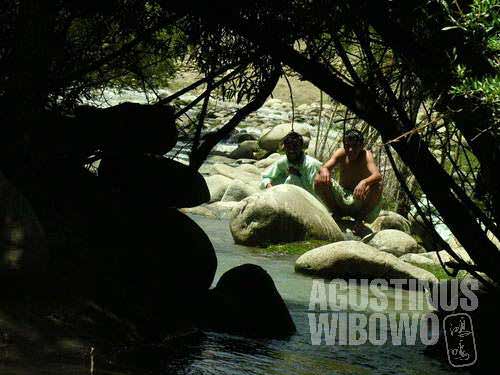
Shower here is surely much better than the one inside the old stinky building. And from here, you can peek into Tajikistan
Mehruddin and Mohammad Naim, the two traders doing business in Tajikistan offered me to go to the public shower (hammam e omomi). This one is a free one. Just have shower in the riverside. Life in the village is very simple. Our restaurant has no toilet and the toilet business just can be done on the ground. Practical, no need even to dig any holes. Just squat and do it. In the morning the ground become fertile soil scattered by human fertilizer, produced by the restaurant workers, guests, travelers, and villagers. I was therefore desperate of a comfortable hammam. The river was a small river behind the road. This river heads to the big Amu Darya, the historical river that bordered northern Afghanistan. The water was extremely cold. Mehruddin said in Tajikistan in hammam one needed not to wear anything, but in Afghanistan it was essential to cover. He lent me his boxer and I started to “swim” in that 15 cm deep little stream.
Lunch in the restaurant is again the gathering time of the travelers and guests. The menu is only rice and meat soup. The little boys were busy of preparing the whole morning. During lunch time, as well as dinner time, the generator is turned on so that the guests may watch recent gossips from the TV set. There were some men coming with Kalashnikov guns. It’s not a surprising scene in Afghanistan. The men were security guards of the town. The air was also filled by the smell of marijuana, and may be also opium, and most of the men chew naswar, the traditional addictive drugs. Drugs are not foreign to people in this area.
Talking about the drug culture, Syed Mohabbat shah (his name literary means King of Love), 42 year old pharmacist graduated from former Czechoslovakia, told me that drug addict was big problem here. The man works in drug rehabilitation center in Ishkashim, and the patients also included many women and children. In Ishkashim, poppy (Farsi: taryaq) is not grown. But the people of Ishkashim, as well as Wakhan and Shernon are notorious as loyal consumers. The people of Baharaq, Jurm, Wardooj, Khosh, Argu, Darayum are the producers. The poppy is cultivated and sold to the consumer districts. The people of Ishkashim and areas along the Tajik border are Ismailis. I was not sure whether there was relation with the high drug addiction case. But this area is undeveloped. Just recently the Ismaili Aga Khan foundation started the development, health service (like the modern new hospital of Ishkashim) and agricultural programs in the area. “They helped us a lot,” said Mr Muhabbat. The Swiss-born Aga Khan is Ismaili spiritual leader and Aga Khan organizations has brought development to the Ismaili areas like Northern Areas in Pakistan, Wakhan Corridor of Afghanistan, and GBAO of Tajikistan.
Mr Muhabbat has modern vision about his country. It might have something to do with his education in the European country. He went there 12 years ago when civil wars took place in his homeland. When he returned back, his country was destroyed. His idea of modern life cant be implied in his village of Ishkashim, where despite of majority of people are Ismaili followers, the women still wear burqa. Burqa does not exist in Ismaili teachings. The burqa in Ismaili society in Ishkashim, said him, was the result of pressure of the culture which was pushed by the Sunni majority of Afghanistan. He also added that burqa was for the safety of the woman herself.
When I was talking with Mr Muhabbat, we were suddenly surrounded by two dozens of spectators, all males, ranged from little garbage-picker boys until bearded men in their 70’s. All were excited to see foreigner, rarely to be seen in their village.
When the night falls, again the restaurant is willed by guests to have dinner and TV entertainment. Afghans are very religious. Not only they always bring the shawl on their shoulder all the time, so they can deliver prayers at any place, they also observe the prayers on exact times. The TV was shut down and the hall of the restaurant became deserted in order of seconds after the azan, the prayer calls, were heard.
TV is also media of socialization. About twenty men in the halls concentrated deeply to the news programs and discussed about the current issues. Many of the men came from uneducated background like truck drivers, farmers, and mechanics. The recent discussion was about moral situation in today Afghanistan, after the Department of Moral and Virtue (Amar Ma’ruf Nahi Munkar) of Taliban regime was abandoned. Coincidentally the news then delivered a crime case of a transsexual who was sentenced due to kidnapping a boy, caused by his/her desperateness to have a child. The people in the restaurant thought it was funniest news of the day. I wished I mastered more Farsi so I could understand what they were laughing about.
These male guests, as well as their countrymen throughout Afghanistan, stick at Tolo TV at 8:3 until 9 p.m. daily for watching the Farsi dubbed, family Indian serial about the infamous mother-in-law.
It’s not only Tajikistan which has strong influence here. The far away India is also a considerable player.

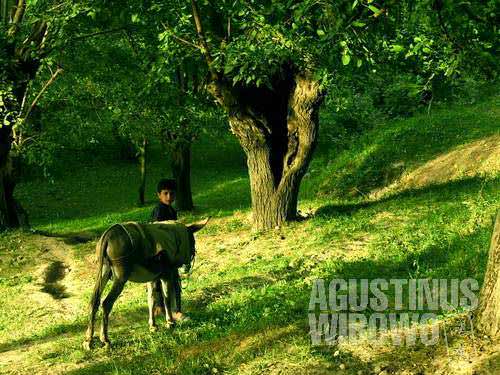
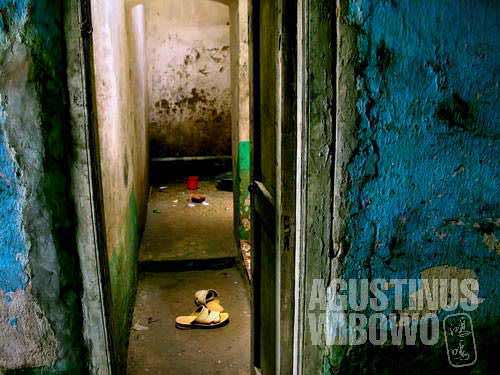
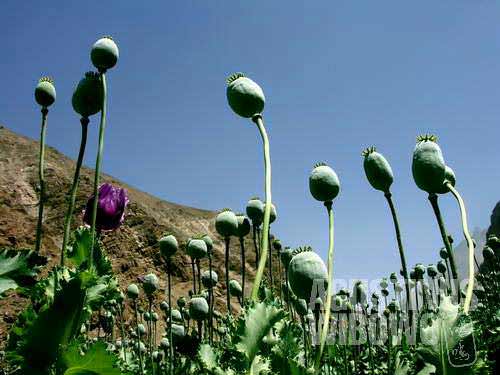
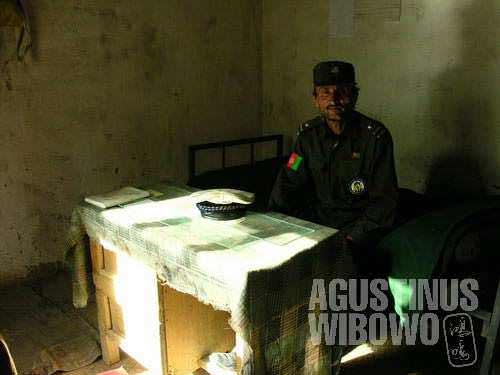
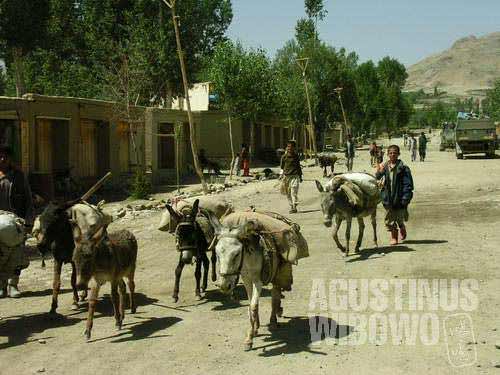
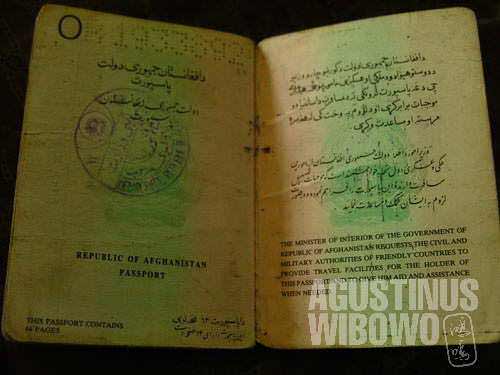
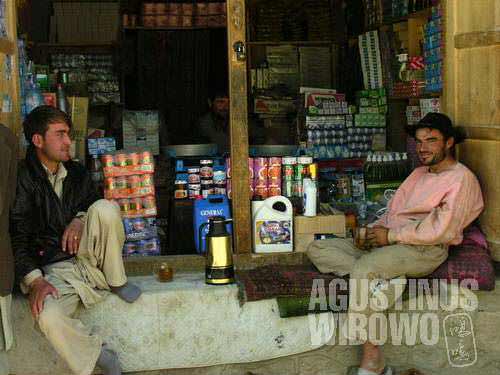
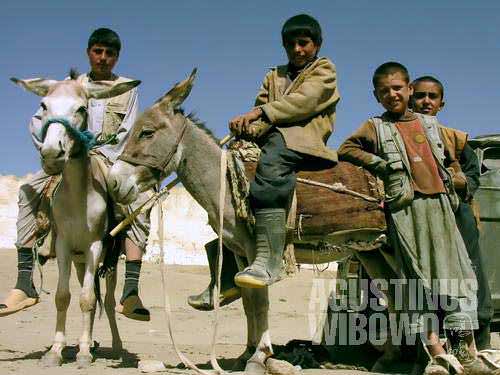
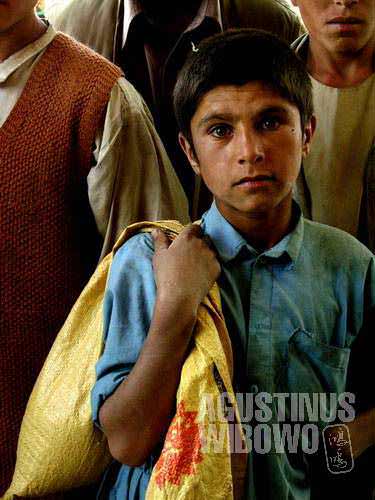
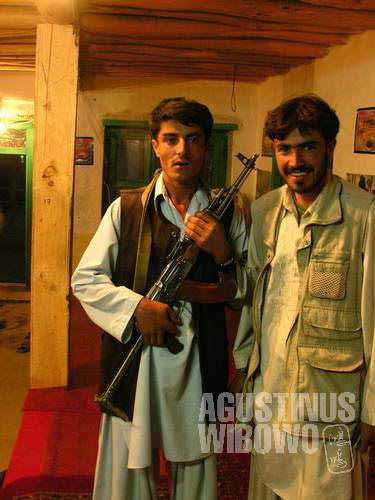





Leave a comment